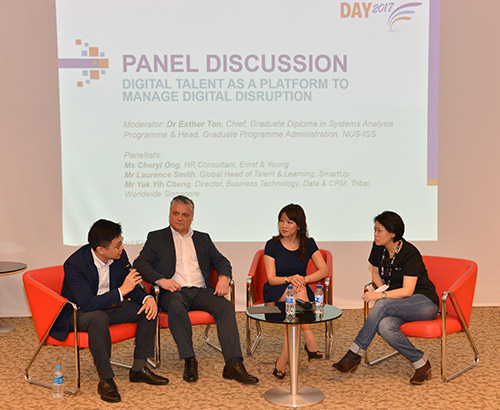"You may be the top talent in a certain field, but if you cannot convert your domain knowledge into something that makes business sense, then your skills are not very useful for any organisation," said Cheryl Ong, Human Resource Consultant, Ernst & Young.
"Therefore, what HR Managers are looking out for, is the business acumen," Cheryl added. "Technology is an enabler - it's something that's part of your everyday life. Pretty much everyone can use technology, so a digital talent is not defined as someone who knows how to use technology, but how they use it."

Speaking at the NUS-ISS Learning Day 2017 panel discussion on digital talents, Cheryl, along with other panellists shared their experiences and insights on hiring digital talents, as well as the X factors that employers look out for during the recruitment process.
Moderated by Dr. Esther Tan, Chief of Graduate Diploma in Systems Analyhsis Programme & Head, Graduate Programme Administration, NUS-ISS, the panel also featured Laurence Smith, Global Head of Talent & Learning, SmartUp, and Yah Yih Cheng, Director of Business Technology, Data & CRM, Tribal Worldwide Singapore.
It's not about acting digital, but thinking digital
Laurence added that what is important, is the mindset of the candidate. "It is the ability to translate what they know to the rest of the organisation, whether internally or externally."
He raised the example of the widespread anxiety over artificial intelligence (AI) and its potential for taking over jobs. "People see AI as a threat to their jobs, and it stems from two things. Firstly, a natural fear of the unknown, and secondly, the fact that even though we talk a lot about creating new jobs, no knows what they are yet."
Therefore, there is a need for everyone to work towards to understanding AI. "When you get tech people who have the business acumen, they can help business departments to understand the digital world, by explaining technical issues in layman terms. The aim is to build a culture whereby the tech and business people can communicate and work together seamlessly. If these two groups can come together, it's a powerful and magical combination."
Yih Cheng echoed the view. "I often ask candidates what they would change about their previous company, if they had the power to. If the answer resonates with the direction that Tribal Worldwide is going towards, then they are in. The candidate's thought process is very important because as long as they have the right mindset, then they just need some time and guidance, and they will really grow," he said.
Are companies ready for the new generation of talents?
A recent study had shown that among all the Asia-Pacific (APAC) countries, Singapore is expected to be hit the hardest by the shortage of digital talents in the near future.
But as companies scramble to acquire more digital talents, they also need to think about how these new hires will change culture and workflow of the current organisation. The question is, how ready are the management, especially that of legacy organisations, to receive and be disrupted by these alternative talents?
Yih Cheng said that a lot of Tribal Worldwide's clients had been looking into digital marketing. "Traditionally, what companies do is that they hire a digital marketer to handle all the digital aspects. But that will result in the knowledge being silo-ed in one person. Everyone else keeps their hands off because they think that it's someone else's job. But this shouldn't be the case - the role of the digital marketer should be to help the traditional marketer understand the digital process. They need to be able to communicate with each other, and that is when cross-pollination can happen. The end goal is actually not digital marketing, but marketing in a digital world," Yih Cheng explained.
Laurence, who was previously the Managing Director & Group Head of Learning & Talent Development at DBS, had similar views.
Sharing about the digital transformation experience of the bank, he explained that it wasn't so much about bringing digital talent into the organisation, but trying to get the core of the bank to start behaving digital. The staff were put through a learning experience, in which they were give real problems to solve. The process also helped them to build up their team dynamics. "It was a combination of theory and practice of the experience, that made it work," he said.
As digital skills become a business imperative, it is easy fall into the trap of assuming that having certain skillsets are bound to get you through a job interview.
Given the rate at which technology is evolving, it wouldn't take long before new approaches completely overturn the current digital - and business - landscapes. Companies that want to benefit from the latest advances need employees who are able to learn and adapt quickly.
As the panellists emphasised time and again, employers are not on the lookout for computer science graduates, and it is not the people with specific hard skillsets that catch their eyes. Rather, it is the mindset that matters.
In other words, a digital talent needs to be, first and foremost, a talent.
If you've missed the NUS-ISS Learning Day 2017, read about the event here